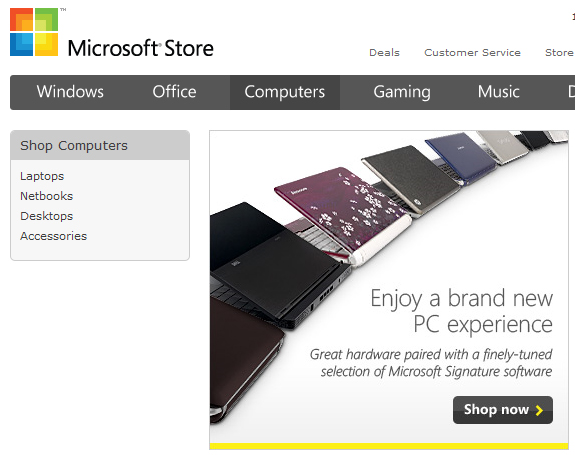Microsoft enters PC retail, sells Windows 7 systems on its website


Microsoft has previously indicated that would sell PCs at a pair of handful of brick-and-mortar stores (in Scottsdale, Ariz., and Mission Viejo, Calif.), but the online store has seen an overhaul and now offers products beyond Microsoft's own lineup of software and services.
The store features versions of Windows 7 for sale, of course, but also an array of machines running the new operating system, segmented by "desktops," "laptops," "netbooks" and "accessories" and arranged by price -- in line with Microsoft's recent "Laptop Hunters" advertisements that uses price point as a distinguishing factor versus Apple's Macs.
The laptop category includes the Lenovo G550, Acer Aspire Timeline AS 4810, HP Pavilion DM3, Sony VGN-NW250F, Dell Studio 15, Sony VGN-FW 520F/B, Dell Studio XPS 13 and Dell Adamo. Prices range from $599 to $1,549.
The desktop category includes only the Lenovo A600 for $999.
The netbook category includes the Lenovo S-102, Acer AOD250 and Sony W. Prices range from $350 to $499.
The accessories category includes everything from Microsoft keyboards and mice to the Flip Ultra HD mini camcorder, a Samsung LCD monitor, Altec Lansing speakers, HP printer, Seagate hard drives and D-Link DIR-655 Xtreme N Dual Band Gigabit router.
The store also sells several other items as diverse as the Zune HD portable media player, software such as Norton 360 and Adobe Photoshop, and the Xbox gaming system.
Why only certain products? Hard to tell. From a computing standpoint, perhaps Microsoft chose systems it knew would run Windows 7 without hiccup -- but that still leaves the question of why its store is offering netbooks, which are underpowered by nature.
Whether it's a token gesture by Microsoft or a preview of its in-store retail strategy is anyone's guess. Either way, the move should help bring Microsoft and ODMs together in the minds of consumers.